When it comes to city passes and travel cards, it’s usually fairly easy to figure out whether they would be worth it for you or not. For things like the Paris Pass or London Pass, they have a list of the most popular attractions and how much they cost, right there for you to see. The Swiss Travel Pass, however, is shrouded in mystery, or at least it was until I spent several days tracking down all of the prices and benefits.
A great many of the visitors and commenters on my popular page about where to go in Switzerland on a short visit are wondering whether the Swiss Travel Pass is a good deal. Embarrassingly, I’ve always had to answer that I found the pass too confusing to confidently advise people on. Now that has all changed, after literally days of research.
Note: This article was last updated in February, 2024.
Disclosure: This is a reader-supported website and some of the links are affiliate links where a small commission is paid to help keep this site going, but the cost to visitors is the same. The Swiss Travel Pass seems quite expensive at first, so it felt like it might be hard to get your money’s worth out of it. As it turns out, it’s pretty easy to get good value, and it’ll be a good deal for many visitors.
New in 2024
Prices increased an average of 5.9% from 2023 on the Swiss Travel Passes, but the Half Fare Card remains at CHF120, which is where it’s been for many years. Train fares in the country increased by similar percentages so the value is basically unchanged. There were no other notable changes to service or the included attractions and train routes.
>>>Buy the Swiss Travel Pass online
Where to stay in Interlaken and the Lauterbrunnen Valley
Since most people reading this will be visiting the Interlaken area and I get so many questions about it, I decided to write a detailed guide on which area to stay in while visiting this area.
>>>Where to stay in Interlaken or the Lauterbrunnen Valley in Switzerland
I included many huge photos in that post so readers will be able to get a better idea of what each place looks like and they are worth a look by itself.
>>>Lucerne or Interlaken: Which to visit and how long to stay?
The article just above will help you decide on how long to spend in each of Switzerland’s two best tourist areas.
Are you 100% sure where you want to go in Switzerland? This should help
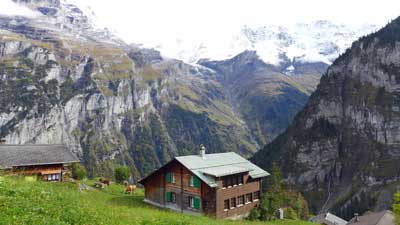
Zurich and Geneva are pleasant but dull. The good news is that Switzerland is packed with amazing sights and none of them are the big cities. If you aren’t 100% locked in yet, please read the article below and I think you’ll enjoy it.
Is the Swiss Travel Pass a good deal? Here's the short version

The bottom line is that the scenery, train journeys, and cable car rides in Switzerland are stunning and not found anywhere else in the world. They are also quite expensive if you pay for them one at a time. So no matter how you visit Switzerland, you are going to be paying quite a bit, or skipping the absolute best things that you’ve come there to see.
With good planning it’s quite easy to get great value out of a Swiss Travel Pass, but it might be a poor choice for those who don’t like to plan ahead. You can easily do a scenic train ride and a cable car in the same day, and still have time to do a scenic hike in the process.
First class or second class? Good news for most people
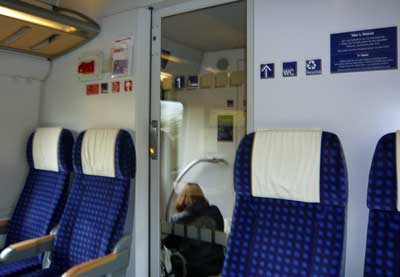
That said, Swiss Trains are literally the nicest in Europe and even the Second Class seats and carriages are nicer and roomier than trains in neighboring countries. The First Class seats are larger and nicer with only 3 across the cabin instead of 4, but honestly Second Class is perfectly comfortable for almost everyone.
Again, First Class on European trains like this is generally popular with business travelers where the company is paying and they need to get work done during the ride, and also senior citizens who don’t want to worry about a carriage full of backpackers. For most of the rest of us, Second Class is more than comfortable enough and the seat width and legroom compare to business-class airline seats. I’m a big and tall guy and I almost always travel in Second because it’s plenty comfortable enough and all the seats arrive at the same time anyway.
The longer you'll be in Switzerland, the better deal a Swiss Travel Pass will be
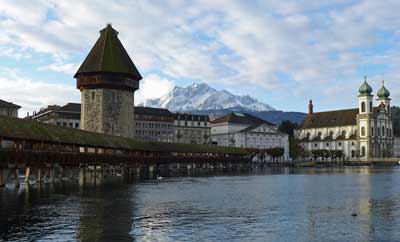
In other words, if you are staying 5 days or fewer, you have to do the math to determine your best option. But if you are spending even 6 or 7 days in Switzerland then the 6-day or 8-day Pass is almost guaranteed to be a great deal and your best choice. Once you have a Swiss Travel Pass you’ll absolutely love the ability to just hop on any train (excellent trains, always on time) and most boats and cable cars without having to worry about the cost. The per-day cost of an 8-day Pass even if you only use 6 of those days is about CHF65, and Switzerland is filled with amazing train rides and boats and cable cars that can get you that much value before noon each day.
Schilthorn (50% discount) and Jungfraujoch (25% discount) are cheaper with a Swiss Travel Pass
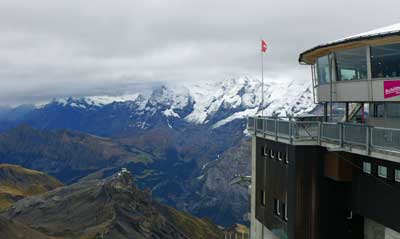
Both of those peak experiences are extraordinary and different from each other. Even so, compared to Jungfraujoch, Schilthorn is also faster and more comfortable on the way up and down. You can enjoy an excellent visit to Schilthorn in 4 hours or so (or a bit longer if you eat at the spinning Piz Gloria restaurant at the top), while a visit to Jungfraujoch requires closer to 6 hours.
NOTE: Schilthorn closes for maintenance for a week or two in late November most years.
Consider the Swiss Half-Fare Card instead
If you AREN’T going to be doing two or more of the long (and expensive) scenic train trips, you will get much better value out of the Swiss Half-Fare Card, which is explained a bit below.
Mt Rigi, near Lucerne, is 100% covered by the Swiss Travel Pass
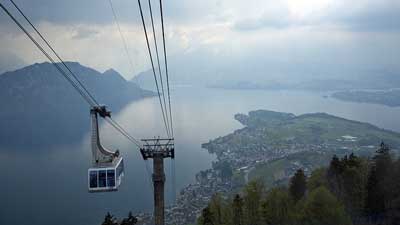
Is a Swiss Travel Pass right for you?
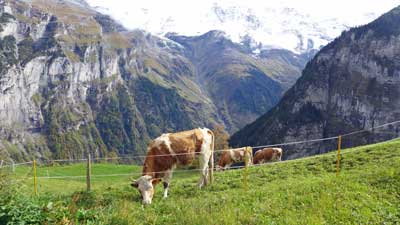
Most people only visit Switzerland for 5 or 6 days at most, so the 3-day and 4-day passes are the ones to focus on. But if you are staying for 8 days or more, those longer passes are almost certainly a great deal for you.
Long story short, if you plan on doing 2 of the more expensive scenic trains and the Jungfraujoch railway or the Schilthorn cable car, then the pass will save you money. Switzerland is expensive, but it’s worth it, and the travel pass can help make it a bit more affordable.
What the Swiss Travel Pass includes
- Free rail travel on normal trains and most scenic trains
- Discounted travel (about 50%) on popular tourist mountain trains
- Discounted travel (about 50%) on popular tourist cable cars
- Free travel on public transport in 75 towns and cities
- Free entry to around 500 museums in Switzerland
The Swiss Travel Pass covers the fare on the most popular scenic and panoramic trains. You can choose a normal seat in a regular carriage for no additional cost, but there is a supplement of CHF8 to CHF49 for a reserved seat in one of the special panorama carriages on these routes.
Prices of the 2024 Swiss Travel Pass
1st Class
- Adult 3-day Pass: CHF389
- Youth (4 to 25) 3-day Pass: 274
- Adult 4-day Pass: 469
- Youth (4 to 25) 4-day Pass: 330
- Adult 6-day Pass: 602
- Youth (4 to 25) 6-day Pass: 424
- Adult 8-day Pass: 655
- Youth (4 to 25) 8-day Pass: 469
- Adult 15-day Pass: 723
- Youth (4 to 25) 15-day Pass: 512
2nd Class
- Adult 3-day Pass: CHF244
- Youth (4 to 25) 3-day Pass: 172
- Adult 4-day Pass: 295
- Youth (16 to 25) 4-day Pass: 209
- Adult 6-day Pass: 379
- Youth (16 to 25) 6-day Pass: 268
- Adult 8-day Pass: 419
- Youth (16 to 25) 8-day Pass: 297
- Adult 15-day Pass: 459
- Youth (16 to 25) 15-day Pass: 328
Swiss Travel Pass Flex
This version costs a bit more, but you don’t have to use the travel days consecutively. It’s a great option for anyone who won’t be taking longer train rides each day.
- Adult 3 Flex days in 1 month (1st Class): CHF445
- Adult 3 Flex days in 1 month (2nd Class): 279
- Adult 4 Flex days in 1 month (1st Class): 539
- Adult 4 Flex days in 1 month (2nd Class): 339
- Adult 6 Flex days in 1 month (1st Class): 644
- Adult 6 Flex days in 1 month (2nd Class): 405
- Adult 8 Flex days in 1 month (1st Class): 697
- Adult 8 Flex days in 1 month (2nd Class): 439
- Adult 15 Flex days in 1 month (1st Class): 755
- Adult 15 Flex days in 1 month (2nd Class): 472
Where to buy the Swiss Travel Pass
The Swiss Half-Fare Card – A better option for many visitors
Far less confusing than the Swiss Travel Pass, you can instead get a Swiss Half-Fare Card, and it will be a better deal for many travelers. The price is lower and it’s much easier to do the math, and the discounts are greater on some things as well.
- Swiss Half-Fare Card for 30 days: Adults – CHF120 or US$129
What you get:
Those who buy the Swiss Half-Fare Card will get 50% discount on all trains, buses, and boats in Switzerland for up to 30 days, as well as 50% off all public transportation in 75 cities and towns.
>>>Buy the Swiss Half-Fare Card
Why the Half-Fare Card is a better deal for many
While the Swiss Travel Pass is a great deal for those doing many of the expensive scenic journeys and mountain sights within a few days, it’s not good value for those who are doing fewer of the expensive trips and/or those who are staying longer. Also, the Swiss Travel Pass only provides a 25% discount on the amazing Jungfraujoch Railway, which costs between CHF120 and CHF224 return depending on your starting point, while the Half-Fare Card provides a 50% discount.
The math is simple as well. You can just add up the cost of the trains, boats, and buses you’ll be taking while in Switzerland, and if the total is more than CHF240 or so, the Half-Fare Card will save you money.
Example itinerary:
- Zurich to Interlaken train (2nd Class): CHF50
- Schilthorn Cable Car: CHF112
- Jungfraujoch railway from Interlaken: CHF205
- Interlaken to Lucerne train (2nd Class): CHF33
- Mt Rigi roundtrip from Lucerne: CHF84
- Engelberg (near Lucerne) to Mt. Titlis Cable Car: CHF92
- Lucerne to Zurich train (2nd Class): CHF25
Total per person: CHF601
Total with Half-Fare Card (including price of card): CHF420.50
It would be tough to do all of those things in 4 days, although it is possible. If you bought a 4-day Swiss Travel Pass here is how it adds up:
4-Day Swiss Travel Pass: CHF259
Supplements for Schilthorn, Jungfraujoch, and Mt. Titlis: CHF203.25
Total cost: CHF462.25
Bottom line on the Swiss Half-Fare Card
Since the Half-Fare Card lasts 30 days and provides a larger discount on Jungfraujoch, it is better value for visitors who want to include that scenic top-of-Europe rail journey on their trip. The discounts also add up more quickly on Schilthorn and Mt. Titlis trips, just to name two examples, and you don’t have to take many longer rail journeys to get value out of the Half-Fare Card.
Swiss Saver Day Pass (A one-day unlimited travel pass)
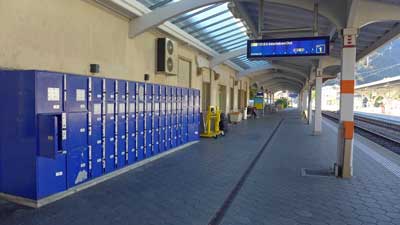
If you buy the Saver Day Pass at least 21 days in advance (and up to 60 days in advance) the 2023 cost is:
- 2nd Class (with Half Fare Card): CHF29
- 1st Class (with Half Fare Card): CHF82
- 2nd Class (with no Half Fare Card): CHF52
- 1st Class (with no Half Fare Card): CHF97
Once you research the normal cost of Swiss train fares you’ll see that the above prices are a very good deal for anyone riding more than 150 kilometers or so in a day. If you are just going, for example, from Zurich to Lucerne or Interlaken on a day, it’ll be cheaper to just buy that ticket individually. But if you are going from Geneva or Montreux to Interlaken or Lucerne then the Saver Day Pass will be much cheaper. Better still, you can use a Saver Day Pass to go from Interlaken to Geneva and back on the same day on the Goldenpass line and returning on the faster train through Bern, and it will still all be included for free.
If you don’t buy a Saver Day Pass at least 14 days in advance it’s more expensive, and if you only buy 1 to 3 days in advance it’s VERY expensive, so the key is to buy early. This is all confusing, but the Saver Day Pass should be a great option for many people only in Switzerland for one to three days.
Popular Swiss panorama scenic trains
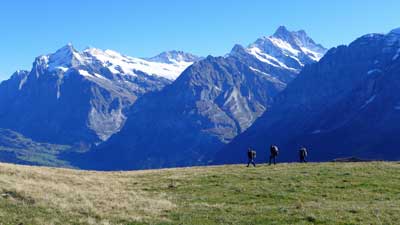
- Glacier Express
- Route: Zermatt to St. Moritz
- Train type: Panorama
- Journey time: 8 hours 3 minutes
- Distance: 291km
- 1st Class fare: CHF272
- 2nd Class fare: CHF159
- Compulsory seat reservation fee: CHF44 or 49
- Supplement for Swiss Pass holders: 13 to 33 for panorama carriage
- Bernina Express
- Route: Chur to Tirano and Lugano
- Train type: Panorama and bus
- Journey time: 4 hours 13 minutes and 3 hours 10 minutes
- Distance: 148km and 90km
- 1st Class fare: CHF113
- 2nd Class fare: CHF66
- Compulsory seat reservation fee: CHF32
- Supplement for Swiss Pass holders: 10 to 14 for panorama carriage
- GoldenPass Line
- Route: Lucerne to Montreaux
- Train type: Panorama
- Journey time: 5 hours 8 minutes
- Distance: 191 km
- Prestige Class fare: CHF131
- 1st Class fare: CHF96
- 2nd Class fare: CHF56
- Supplement for Swiss Pass holders: 8 to 15 for panorama carriage
- Gotthard Panorama Express (formerly Wilhelm Tell Express)
- Route: Lugano or Locarno to Lucerne
- Train type: Panorama and boat
- Journey time: 5 hours 21 minutes
- Distance: 182 km
- 1st Class fare: CHF164
- 2nd Class fare: CHF135
- Supplement for Swiss Pass holders: 39 to 49 for panorama carriage
- Swiss Chocolate Train
- Route: Montreux to Broc round trip
- Train type: Panorama or First Class
- Journey time: X hours X minutes
- Distance: 82 km
- 1st Class fare: CHF99
- 2nd Class fare: 89
- Supplement for Swiss Pass holders: 39
Popular Swiss scenic and theme trains
The scenic trains below are also extremely popular as sightseeing journeys rather than just as transportation, but can be used as both.
- Jungfraujoch round trip
- Route: Interlaken to Jungfraujoch
- Train type: special mountain train
- Journey time: 4 hours 41 minutes, round trip, plus time on top
- Distance: 73 km
- 1st Class fare: N/A
- 2nd Class fare: CHF224
- Supplement for Swiss Pass holders: 147 (so, a saving of CHF77)
- Gornergrat Railway
- Route: Gornergrat Railway
- Train type: Cog railway
- Journey time: 44 minutes return
- Distance: 10 km
- 1st Class fare: N/A
- 2nd Class fare: CHF90
- Supplement for Swiss Pass holders: 45
- Rigi round trip
- Route: Lucerne to Rigi
- Train type: Cog railway
- Journey time: 3 hours 25 minutes, plus time at the top
- Distance: 58 km
- 2nd Class fare: CHF78
- Supplement for Swiss Pass holders: None (this one is free with the pass)
- Mt Rigi Excursion (one-way and walk down)
- Route: Lucerne to Mt Rigi
- Train type: cogwheel train and/or cable car
- Journey time: 45 minutes up
- 1st Class fare: N/A
- 2nd Class fare: 49
- Supplement for Swiss Pass holders: 0
- Lotschberg Mountain Route and Centrovalli
- Route: Bern to Locarno
- Train type: Narrow gauge
- Journey time: 4 hours 40 minutes
- Distance: 212 km
- 1st Class fare: CHF158
- 2nd Class fare: CHF90
- Supplement for Swiss Pass holders: 5
- Jura round trip (Watchmaking Tour)
- Route: Neuchatel through Jura
- Train type: Regular
- Journey time: 3 hours 0 minutes
- Distance: 143 km
- 1st Class fare: CHF168
- 2nd Class fare: CHF108
- Supplement for Swiss Pass holders: 0
- Pre-Alpine Express
- Route: St. Gallen to Lucerne
- Train type: Regular
- Journey time: 2 hours 15 minutes
- Distance: 146 km
- 1st Class fare: CHF83
- 2nd Class fare: CHF47
- Supplement for Swiss Pass holders: 0
- Jura Foot Line
- Route: Basel to Geneva
- Train type: Regular
- Journey time: 2 hours 40 minutes
- Distance: 248 km
- 1st Class fare: CHF132
- 2nd Class fare: CHF75
- Supplement for Swiss Pass holders: 0
Popular Switzerland cable car rides
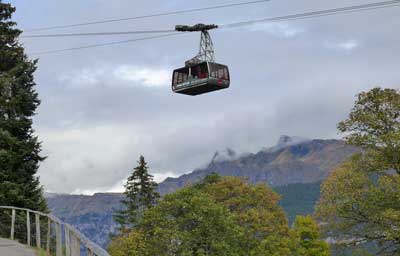
- Schilthorn
- Route: Stechelberg (Lauterbrunnen) to Schilthorn
- Train type: cable car
- Journey time: 1 hour
- 2nd Class fare: CHF108
- Supplement for Swiss Pass holders: 54
- Engelberg to Mt. Titlis cable car
- Route: Engelberg to Mt. Titlis
- Train type: cable car
- 2nd Class fare: CHF96
- Supplement for Swiss Pass holders: 46
The Swiss Travel Pass also includes free museum admission, but…
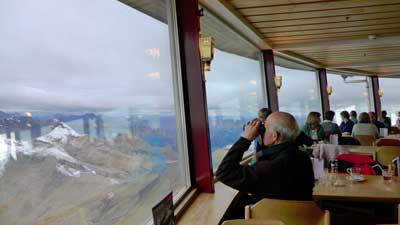
The problem is that the museums are only free on valid travel days, and almost no one would visit more than one or two museums with a Swiss Travel Pass. The trains and cable cars are so expensive that the pass gives very good value to cover those, so you don’t want to waste precious sightseeing time walking through a museum that only costs CHF10 anyway.
In other words, calculate the value of a Swiss Travel Pass on the travel savings only, and if you visit a museum here or there, then great. Most people are better off trying to squeeze in an additional train ride each day, and ignoring the museums. Switzerland is all about the outdoor scenery. As nice as the museums may be, they are not why you are there.
The pass includes free public transport in most Swiss cities
Similar to the free museum part of the offer, it’s best to ignore or minimize the value of free public transportation. It could be helpful in Zurich, but in most other Swiss tourist towns you won’t need much public transport. In fact, in Interlaken, each hotel or hostel guest automatically gets a card for free public transportation within the town (including between the two train stations).
So you might use a ride or two each day on public transport, but that won’t add up to much in terms of value of your Swiss Travel Pass.

Hi Roger,
I am planning to visit Switzerland for 3 days. I understand it’s not enough to visit all places. I am thinking to visit just apls. I will be flying to and from Zurich. I went on several websites and routes are confusing. I would really appreciate if you can help me with 2-3 days itinerary.
Thank you,
Lad
Lad,
Three days in Switzerland is enough to see the most dramatic highlights, which are clustered around Interlaken. Have a look at my article on where to go in Switzerland and it will answer most of your questions. From Zurich Airport it takes about two hours by train to Interlaken. I’d stay in one of the villages in the valley for the most memorable experience. Those are Gimmelwald, Murren, Wengen, Grindelwald, and Lauterbrunnen and they are all mentioned in the article. Let me know if you have any other questions. -Roger
Hello. Thanks in advance for your help. I am American so don’t have a pass of any kind.
I am arriving Zurich in June and staying in a hotel in town for the 3 full days I need advice for. I am staying in Zurich every night, so all travel is round trip. There are 2 people, my husband and I. My plans are as follows with a “see and do things there” plan at each place (not yet fully determined):
Day 1 – Train round trip to Lucerne
Day 2 – Train round trip to Bern
Day 3 – Stay in Zurich and sightsee in town
(of note, Day 0 I have covered with a tour)
I can’t figure out which Swiss Pass – if any – to get.
Since my dates are a couple of months out, I can:
a) Get a Swiss Saver Day Pass for 70 CHF on Day 1 (cash cost is 50 CHF round trip) and 52 CHF on day 2 (Bern where cash cost is 100 CHF per person roundtrip)- per person – and then a pay as you go ticket Day 3 in Zurich (we are catching a prepaid train out the last evening)
b) I can buy a half fare card (120 CHF) and then pay 1/2 fares to Lucerne and Bern and the pay as you go for Day 3 but I’m only saving 75 CHF each – I could also do additional activities but not sure that’s worth it.
c) SuperSaver Fares each way for Day 1 and 2
d) 3 day unlimited Travel Pass
e) Better option??
Please help me sort this out. I have been fretting over this for weeks. I think the Saver Day Pass looks like the best option but I’m not sure.
Ayanna,
In case you haven’t seen it yet, you might have a scan of my article on where to go in Switzerland. Zurich is nice, but really it’s the Alpine scenery that is the big draw in Switzerland. Bern is a charming small city and it’s worth a visit, though on a trip that short I think I’d focus more on Interlaken and Lucerne, even if you are locked into staying in Zurich. That is my best advice although if you did the plan you mentioned I’m sure you’d enjoy the trip anyway. The Interlaken area (and specifically the Lauterbrunnen Valley) has the most dramatic scenery in Europe. Zurich is the home of some large banks and drug companies.
If you stick to your original plan then I think the Saver Day Pass idea is a good one. Once you get to Lucerne you’ll definitely want to take one of the lake cruises and perhaps even go up Mt Rigi while you are at it. The cruise and the cable car and mountain train up and down Mt Rigi are all covered by the Saver Day Pass, so you’d get a LOT of use out of that.
Beyond that, it really depends on what you do those other two days. There isn’t anything else in Bern that you’d use the pass on, so it’s probably just better to pay for the train. And if you are staying in Zurich you definitely wouldn’t need a pass for that day. Let me know if you have any other questions. -Roger
Thank you, Roger! A few more questions:
Do you advise booking our travel from Venice now? Or just the Switzerland portion? It sounds like the Swiss Pass might be my best bet also because my children are under 16. Even though my pass will not be validated, will I be able to make the reservation? Do you recommend a 1st Class Pass considering the route we are taking?
Thank you for your sound advice.
Jennifer,
Train tickets within Switzerland only go on sale 30 days in advance and they are generally the same price no matter when you book them. This is very unusual for Europe, as nearly all other countries have dynamic pricing where tickets are cheaper the earlier you buy. So I’d definitely think about buying the Venice to Switzerland portion soon and any other international legs.
With a Swiss Travel Pass you don’t need a ticket or reservation on normal city to city trains, although you DO need a reservation on panoramic carriages on special trains and many tourist-oriented mountain trains. So if you are going to have a Swiss Travel Pass AND you are going to validate it on the day you arrive, you can just book a ticket to the first stop in Switzerland and show your pass for the remaining portion. And one child under 16 can ride free with a paid adult with a (complimentary) Swiss Family Card, which you can request when you get your Swiss Travel Pass.
I wouldn’t pay that much more for a 1st Class pass, and I’m not sure kids would ride free in 1st Class either. Swiss trains (and the international trains into Switzerland) are generally new and quite comfortable. Legroom is similar to Business Class on a train and the seats are wide enough for pretty much everyone. First Class gives even more legroom and the seats are wider because they are 3 across instead of 4 across. Some people (especially older, more affluent people) prefer to ride First Class because the carriages are often mostly empty. In Second Class you might find that you are traveling with a group of school kids or something and every seat is taken. Usually, 2nd Class is very comfortable and not too crowded though. I hope this helps. -Roger
Hello, Roger-
We will be traveling the second week of June with our children ages 13 and 15 from Venice en route to Mürren. I am completely lost on the best route to use as well as the best pass to purchase in order to do this. We will definitely want to do the Schilthorn or Jungfraujoch. Leaving on June 13th from Venice-3 nights in Mürren-heading back to Lucerne for a day and night on the 16th-flying out of Zurich at noon on the 17th.
Any advice is greatly appreciated!
Jennifer,
From Venice you can buy a train ticket all the way to Interlaken Ost (east) and the leg from Milan into Switzerland is really gorgeous. If you take the 08:32 departure the whole thing takes a bit less than 6 hours and it requires a train change in Milan and another in Spiez, Switzerland. From Interlaken Ost you take a 20-minute train ride to Lauterbrunnen where a bus will meet each arrival and take passengers to the cable car station in nearby Stechelburg. I discuss it in greater detail in my article on where to go in Switzerland.
If you get a Swiss Travel Pass and validate it upon crossing the border into Switzerland you could ride the rest of the way for free, so you’d only have to buy a ticket from Venice to the first city in Switzerland the train stops at. The same would apply with a Half Fare Card, although you’d have to buy a train ticket for the rest of the journey. Depending on the price of the full ticket, it may not be worth it.
I’d say a Half Fare Card would definitely save you money compared to paying full price for everything. A 3-day or 4-day Swiss Travel Pass might be even better if you plan on doing enough included things such as Schilthorn and Mt. Rigi near Lucerne. It all depends on how many things you’d do. The cable car and bus from Murren to Lauterbrunnen or Interlaken would be about CHF15 to 25 each way, so a Pass could save quite a bit of money on just that, and a Half Fare Card will pretty quickly pay for itself as well. Let me know if you have any other questions. -Roger
Hi Roger,
Lovely blog. Thank you for such a detailed review.
Please do guide us. We are a family of 12. 10 plus 2 kids of 3 years and 4 years. We are planning on visiting Switzerland between the 28th of April and 5th of May. The following is our plan:
28th April, we reach Montreux, from Paris. We will have only the evening left. So we will be visiting the Chillon Castle.
29th April, we are taking the golden pass line train upto gstaad and coming back to Montreux
30th April, we will do a day trip to zermatt for the glacier express to Matterhorn.We will get back to Montreux.
1st May, we go to Grindelwald. Check in and head out to interlaken for day activities like paragliding and stuff.
2nd May, we are doing a day trip to jungfrojauch.
3rd may, we go to lucern and check into a hotel and head out for Mount Rigi day trip
4th May, we go to visit Rhine falls, then get back to our hotel in Lucern.
5th May, we travel from Lucern to Zurich airport and fly back to India.
Nandini,
Your plan looks quite good. I’m not sure what help you would like? Based on your plans it’s hard to say whether a Half Fare Card or 8-day Swiss Travel Pass is the better option. If you were doing Schilthorn instead of Jungfraujoch I’d say the Swiss Travel Pass would be better, but if you do Jungfraujoch I think the Half Fare Card is probably best. You could also get one or two Saver Day Passes, which are quite cheap if you have a Half Fare Card and buy them at least two weeks in advance. Let me know if you have any specific questions. -Roger
Hi Roger,
First off, great articles you have written and the fact that you keep responding to people’s question here is really a testament to your genuine spirit to help us so really appreciate it.
I am in the midst of planning our first Euro trip with my wife and part of this stay will have us going thru Switzerland in 3 days mid August. Through my rough research we are excited to take the Golden Pass train from Lucerne to Montreux. I would like your opinion on my preliminary itinerary and any tweaks and suggestions you may have.
Day 1 – Arrival by Train from Germany into Lucerne, tour Lucerne and stay the night.
Day 2 – Lucerne > Interlaken > Lauterbrunnen (walk around) > Murren > Visit Schilthorn or Jungfraujoch(can’t decide! weather dependent) > Grindelwald (1 Night)
Day 3 – Grindelwald > Zweisimmen > Montreaux (1 Night) (Are there any smaller towns worth stopping on this route?)
Day 4 – Montreaux > Lausanne > Train to France (Paris)
I know this is pretty bare, but I’d like your thoughts. I also have not had time to do point to point comparisons so I can choose whether or not to buy Eurail pass or just stick to Swiss Pass on my journey in the Swiss region. I have a feeling Eurail pass might be worth it since I am travelling from Germany by train, and also from Lausanne to France (Paris).
Thank you so much!
Andrew,
Your plan looks really good. Switzerland is stunning in many ways so there are many ways to plan a trip to enjoy the things that interest you most. I like your allotment of time with Lucerne and Interlaken, at least considering you’ve only got 3 or 4 days. Montreux and Lausanne are both lovely as well, and it will be interesting to see some cities and spend time in the French-language part of Switzerland.
When I did the Goldenpass I didn’t stop in any small towns, and my guess is that you won’t feel the desire to do that either. Really it’s just this amazing scenery and farmlands and all that, and you’ll be spending time in Grindelwald, which is a lovely village itself.
As for a rail pass, you might have a scan of my main article on Eurail passes. The short version is that Eurail Passes can be great on longer trips where you want to make plans as you go, but if you already know your plans at least a few weeks in advance you can usually get individual tickets even cheaper if you buy early. So it really depends on what the rest of your trip looks like. Start by comparing the advance purchase “supersaver” ticket price for some of your journeys with the per-day cost of the Eurail Pass you might buy. It’s usually cheaper to buy tickets in advance.
Within Switzerland the train tickets go on sale 30 days in advance and they are the same price no matter when you buy them. The Half Fare Card mentioned in the article above is the best deal for many visitors who aren’t doing many longer train rides. On the other hand, if you do Mt Rigi near Lucerne and Schilthorn near Interlaken in addition to those other train rides, I think a 3-day Swiss Travel Pass might be your best deal because those are fully included. If you think you want to go up Jungfraujoch, on the other hand, then the Half Fare Card is definitely the better deal. Let me know if you have any other questions. -Roger
Hello Roger
My wife and I are planning a Europe trip. I wanted some input on our leg from Paris to Switzerland.
July 2nd – Paris to Interlaken to Grindelwald
July 2-July5 – Stay in Grindelwald (explore and go to Grindelwald First and Jungfraujoch – I know this is additional to Swiss Pass and BO pass; also travel back to Interlaken one day for Harder Klum)
July 5- Travel from Grindelwald to Lucerne to Vitznau (Golden Pass Line Interlaken to Lucerne – I think both swiss pass and BO pass include this) How to get to Vitznau from Lucern train station.
July 5-7 – Stay in Vitznau (explore Mt. Pilatus, maybe rigi )
July 7th – Morning from Vitznau to Zurich Airport – Flight out of Zurich to US 10:55 am. Hotel states there is a shuttle to Risch-Rotkruez then Train at 7am to Zurich Airport reaching at 8 am.
My questions
1. Should I consider getting a ticket Paris to Basel then a 4 Day Swiss Pass (valid July 2-July5) and July 7th separate ticket to Zurich Airport. Swiss Pass 4 day for 2 people 2nd class 562. 1st – 894
2. Should I consider getting Paris to Bern, 6 day Bernese Oberland Pass (Valid July2-July7) and July 7th ticket to Zurich Airport
BO regional pass 6day for 2 people 2nd class 620; 1st 744.
3. Is 1st class worth the extra. we will be Travelling with luggage. 2 bags.
Would love some input on this. I am swaying towards the BO regional pass. Any other recommendations, suggestions and tips more than welcome.
Sincerely
chinp1500
Chin,
From the Lucerne train station to Vitznau you can either take a local train, with one change along the way, or a boat that leaves about once an hour from in front of the train station. The boat is more scenic, but it would be a little hassle if you have much luggage. Either way takes about an hour.
Based on the things on your list it seems like the Half Fare Card might be the cheapest for you. It covers 50% off Jungfraujoch, which almost pays the CHF120 for itself right there. It doesn’t look like you would be doing enough fully-covered things to justify the full Swiss Travel Pass, but you’d have to add them up to be sure.
It looks like it’s the same story with the Bernese Oberland Pass. It isn’t valid in Lucerne or anywhere outside of the Interlaken area, and it doesn’t look like you are doing enough things within that area to make it worthwhile. But again, you’d have to add them up to be sure.
As for First vs Second Class, nearly everyone finds the Second Class to be plenty comfortable. The seats are similar to business class on planes and they have pretty good legroom and room for luggage. To be honest, the best reason to get First Class in Switzerland is if you’d rather not deal with locals or many other tourists. Since Second Class is so comfortable and the Swiss trains are so nice and modern, nearly everyone goes Second Class. On a typical train at noon from Interlaken to Lucerne you’d find that probably 60% of Second Class seats are taken and maybe 20% of First Class seats. That means you can usually find a seat with almost no one around you in First Class, while you are likely to have neighbors in Second. If you can afford it then First Class is really nice. But you’ll still be comfortable in Second Class, and they arrive at the same time, as the old saying goes. -Roger
We are planning to take the ferry from Lucerne to Vitznau then the cog train up to Mt. Rigi Kulm summit then the cable car down to Rigi Kaltbald to Weggis. Would it save us money to buy a 1-day saver pass or saver day pass, rather than pay for each of these separately? Thanks for your help.
Charlotte,
The last time I checked, the Rigi up and down was CHF84, and the ferry adds about CHF20. So if you can get a Saver Day Pass for less than that, it will pay for itself. And you’d probably do at least one or two more things that day if you had a pass. -Roger
Hi!Very informative piece! I am getting a Eurail Global pass for a Europe tour in July. I was initially planning to stay in Interlaken and travel to Wengen, Kandersteg, Jungfraujoch and Grindelwald, all in 3 days. Now I think, since Grindewald falls on the way to Juncfrau, I will probably not make stop there and simply go from Interlaken to Jungfraujoch. In that case, instead of getting a Swiss Travel Pass or Half Fare Pass, should I not just avail the benefit of the Eurail pass? If I buy the Swiss Travel pass I would be paying for the passes+75% of Jungfrau trip and in case of Half Fare pass, I’d be paying for passes+50% of Jungfrau fare. Eurail pass gives a 25% discount on the jungfraujoch tickets already. Do you think that the internal travels from interlaken towards Wengen, Kandersteg warrants buying the swiss passes? Eurail pass also confers a 25% discount on the Schilthorn cable car rides. So from all fronts, I think it’s more economical if I simply reap the benefits of the Eurail pass. Would love your input on my plan! Thank you again for the great article!
Joyce,
I think you are right about all of that. Those train rides within the Lauterbrunnen Valley aren’t terribly expensive (partly because they are all short rides) so I’d also guess that you’d come out ahead on just the Eurail Pass and the discount that it provides. Your plan looks great and skipping Grindelwald won’t be a big thing because all of those villages you’ll be going to are also off-the-charts charming. Let me know if you have any other questions. -Roger
Thank you for your reply.
I was thinking of buying the saver day pay (about 50 franc), there is a child day pass for 16 franc. It seems this pass will cover the boat, train and cable car to Rigi, so was thinking to do that instead of Pilatus. with a family of 8, the tickets to Pilatus are a small fortune. will this pass cover transport for all the trains we need (airport to Zurich, to Lucerne, to Rigi and back again)?
Do you think this is possible in the 12 hours we have (11 AM to 11 PM)?
thanks for your advice.
Sara,
The Rigi trip sounds like a great alternative, and yes, a Saver Day Pass would cover every bit of the travel. They are essentially a Swiss Travel Pass for one day at a time, and you could easily get CHF100 use per person out of those, and probably more on your layover. I do think it’s possible, although you’d have to get as early a start as possible. Lucerne up and down Mt Rigi is probably about 4 to 5 hours, so you wouldn’t have much time to linger. There is a train station at Zurich Airport and some trains go directly from there to Lucerne without having to switch trains in Zurich itself. Also, the Swiss trains are famously punctual, so you can count on them all being on time. If you were doing this in, say, Italy, you’d want to get on a train at least an hour early to be sure to be there on time.
Even if you got off the plane late and didn’t have time for the whole thing, just going to Lucerne and doing the boat trip and looking around those villages would be an amazing day, especially compared to sitting in the airport. Let me know if you have any other questions. -Roger